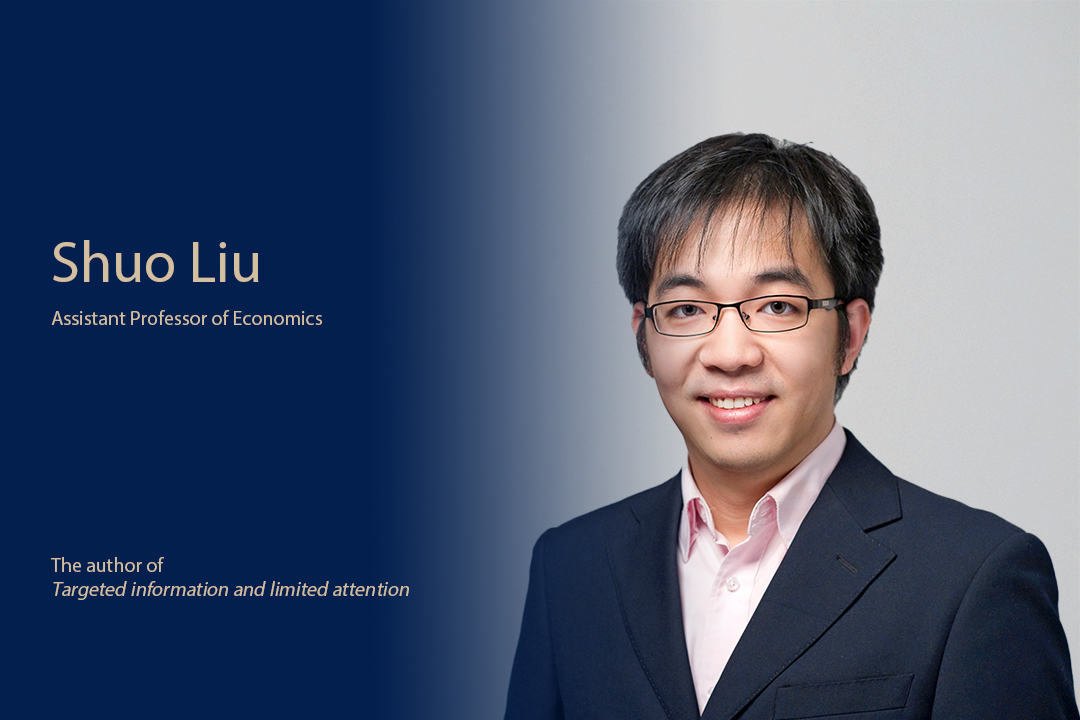Companies in the era of digital economy have access to comprehensive and detailed data of consumers, which, together with the rapid development of targeting technology, has allowed them to send personalized messages to their potential customers. But why are we still constantly overwhelmed by seemingly ill-targeted messages? In a recent research paper published in theRAND journal of Economics, Prof. Shuo Liu from Guanghua and his coauthor Prof. Andreas Hefti uncover the key to understanding this puzzling phenomena: The scarcity of consumer attention.
We investigate the impact of limited consumer attention on the targeting decisions of competing companies. Limited attention changes the strategic role of information delivery, as companies, despite their perfect targeting skills, can be incentivized to behave like mass advertisers. The inclusion of limited attention in a standard targeting framework can explain some of the key recent problems in the advertising industry, such as information overload on the consumer side or increased use of ad-blocking tools.

Modern information systems, especially the Internet, enable marketers to collect enormous amounts of data about their potential customers. In essence, this data enables companies to target their advertisements to their targeted consumers. Information has become an important source of advertising revenue. Large companies like Acxiom, IRI and Nielsen make their money selling consumer data to individual companies. It is also the greatest source of income for search engines. According to the annual report of the Interactive Advertising Bureau (IAB), search-based advertising already accounts for a constant 40% of total digital advertising revenue, which amounted to around 6.76 billion US dollars in 2006 and almost tripled to 18.81 billion US dollars in 2014. Sponsored Advertising has grown approximately 30% annually, from $ 1.12 billion in 2011 to $ 1.88 billion in 2013, and is expected to continue to grow.
Given a company's extensive database of prospects and the wide range of information-sharing technologies, including email, SMS, and social media, it may come as a surprise that several recent press releases have seriously challenged targeting behavior by questioning is it really an advantage for businesses and consumers. When consumer data is so comprehensive and detailed, and personalized advertising is better and cheaper than ever, but why are so many consumers constantly complaining about being overwhelmed by ads that seem to be of little relevance to them while companies seem to be very targeted at your messages address less precision than they could?
In this article, we show that such puzzling observations can be explained by a stylized information-driven competition model if the standard presumption of unlimited consumer attention is relaxed. Attention as a central concept of cognition has long been studied by psychology and neuroscience. Starting with Miller, there is ample evidence that people have limited attention, which means they don't realize all the information they are exposed to once a certain threshold is reached. Therefore, it seems to be a particularly relevant concept in a competitive context. The pervasive and ongoing concern in the advertising industry that an advertiser's messages may simply be overlooked by intended consumers clearly implies that limited consumer attention is a critical factor in markets with specific information.
We investigate the limited effect of consumer attention in a targeting context by adopting a standard Hoteling Duopoly framework with ex-ante uninformed consumer activity. Consumers, in turn, always choose their best-perceived product. The standard (implicit) assumption of unlimited attention is that consumers can, at any time, record and store any information they are exposed to. All the information is available to you. Applied to our duopoly framework, the concept of limited attention means that consumers will receive at most one of the companies in their final purchase decision.
Our main results show that consumer inattentiveness has a profound impact on corporate equilibrium behavior. With attention-constrained consumers and sufficiently low information costs, firms strategically choose to behave as if they were mass advertisers. This is the antipode of the standard prediction resulting from unlimited attention, in which competition forces both companies to exclusively deliver their messages to their main consumers, even if information cost is low. When consumers pay attention to any information, limited attention undermines the protective nature of the provision of information that would otherwise guide companies' targeted decisions.

Our analysis also highlights some consequences of limited attention for strategic pricing, market share, and welfare. In general, traditional fundamentals such as preferences or the degree of product differentiation become less critical in determining equilibrium prices and market shares. For example, the standard positive correlation between the consumer-side transport cost parameter and the equilibrium prices (and profits) becomes negative for distracted consumers. This reflects the fact that, with full attention, the relevant equilibrium threat to a company's pricing decision is that some consumers might switch to a competitor. With limited attention, the pricing decision is driven by concerns that some consumers may be excluded from the market. On the well-being side, consumer inattention leads to inefficiency as companies fail to leverage their targeting skills on the mass advertising balance, leading some consumers to choose overpowering products.
We examined various extensions to the base model. The main effects of limited attention on equilibrium targeting remain the same throughout. In addition, the variations provide additional insights. Specifically, we looked at a situation in which companies must actively compete for each other: Companies can manipulate the likelihood of grabbing the attention of consumers they target by choosing how important their messages should be. We show that the information costs resulting from the strategic competition for attention must always be measured in such a way that mass advertising remains the only offsetting result. These results can help to understand why the leading concern of advertising firms remains whether their messages are even registered by consumers, while consumers simultaneously complain about information overload and seemingly ill-targeted messages.
We also include in our analysis the possibility that consumers may choose to use ad blockers. Ad blocking has increased over time, and this has become a serious challenge for the advertising industry. Increased ad-blocking rates can come as a surprise, even when targeting technology and consumer marketing data have improved significantly.
The intuition for the above results is as follows: Rational consumers choose to block incoming information if and only if the expected effort in processing that information exceeds the expected perceived value of the information provided. With unlimited attention, the market forces companies to target their ads as closely as possible to key consumers. In response, consumers who assume that (i) they will be exposed to less advertising and (ii) the information received will certainly be more relevant to them have less reason to install ad blockers. Hence, the efficient targeting balance, with both companies targeting only their core segments, is still a balancing outcome with perfect targeting skills, and no consumer is blocking consumer presence because the companies' targeting decisions are dominated by the intent to penetrate the main segment of the competition. Fearful that market forces might not lead them to their best options, sensitive consumers tend to use ad blockers to avoid irritation from information overload.
Reference
Hefti, A. and Liu, S. (2020). “Targeted information and limited attention.”The RAND Journal of Economics, 51(2), 402-420.

About the Author
Professor Shuo Liu is Assistant Professor of Economics at the Peking University Guanghua School of Management. His research interests include industrial and organizational economics, game theory, and mechanism design. His papers have been published in top academic journals in economics, such asthe RAND Journal of Economics, Theoretical Economics, European Economic Review, Games and Economic Behavior, Economic Theory, etc.
 Programs
Programs